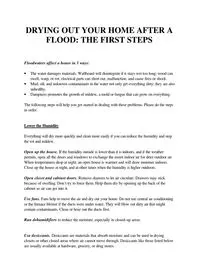
Flood - Drying out your Home PDF
Preview Flood - Drying out your Home
DRYING OUT YOUR HOME AFTER A FLOOD: THE FIRST STEPS Floodwaters affect a house in 3 ways: • The water damages materials. Wallboard will disintegrate if it stays wet too long; wood can swell, warp, or rot; electrical parts can short out, malfunction, and cause fires or shock. • Mud, silt, and unknown contaminants in the water not only get everything dirty; they are also unhealthy. • Dampness promotes the growth of mildew, a mold or fungus that can grow on everything. The following steps will help you get started in dealing with these problems. Please do the steps in order. Lower the Humidity Everything will dry more quickly and clean more easily if you can reduce the humidity and stop the rot and mildew. Open up the house. If the humidity outside is lower than it is indoors, and if the weather permits, open all the doors and windows to exchange the moist indoor air for drier outdoor air. When temperatures drop at night, an open house is warmer and will draw moisture indoors. Close up the house at night, and at other times when the humidity is higher outdoors. Open closet and cabinet doors. Remove drawers to let air circulate. Drawers may stick because of swelling. Don’t try to force them. Help them dry by opening up the back of the cabinet so air can get into it. Use fans. Fans help to move the air and dry out your home. Do not use central air conditioning or the furnace blower if the ducts were under water. They will blow out dirty air that might contain contaminants. Clean or hose out the ducts first. Run dehumidifiers to reduce the moisture, especially in closed-up areas. Use desiccants. Desiccants are materials that absorb moisture and can be used in drying closets or other closed areas where air cannot move through. Desiccants like those listed below are usually available at hardware, grocery, or drug stores. • Chemical dehumidifier packs used for drying boats and damp closets. • Cat litter made of clay. • Calcium chloride pellets (used to melt ice in the winter). Hang pellets in a pillow case, nylon stocking, or other porous bag. Put a bucket underneath to catch dripping water. Close the closet or area being dried. Be careful. Calcium chloride can burn your skin. It will also make the air salty, so do not use this product near computers or other delicate equipment. Call a contractor. There are contractors who specialize in drying out flooded buildings. Look in the yellow pages under Fire and Water Damage Restoration or under Dehumidifying. Be careful about contractors who inflate prices after a disaster. Be patient. Drying your house could take several weeks. Until your house is reasonably dry, damage caused by mildew and decay will continue. The musty odor will stay forever if the house is not dried out well. Sort Contents and Discard Debris You have 3 types of contents. They should go to 3 different places: • Items you want to save • Items to be thrown out • Garbage Things you want to save Move things you want to save to a safe, dry place, such as the second story or outside. The longer they sit in water, the more damaged they become. Don’t leave wood furniture in the sun because it will warp as it dries. Things you don’t want to save Put things you don’t want to save outside to dry until the adjuster comes to confirm your losses. Take pictures or videotapes and list each item for the record. Garbage Get rid of food and anything else that could spoil or go bad immediately. Don’t let garbage build up. Garbage piles will cause yet another health hazard by attracting animals and insects. If your insurance adjuster has not come, tell your agent or adjuster that you need to get rid of potential health hazards. That person will tell you how to make sure that your losses are covered. Then throw the stuff out, preferably in sealed plastic garbage bags. Dispose of discarded items properly. Do not burn or bury them. There will usually be more frequent garbage pickups after a flood. Your local newspapers or local TV and radio stations will have announcements about trash pickup schedules and drop-off sites.
